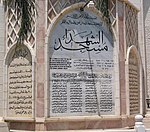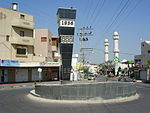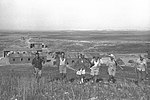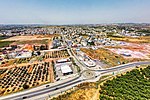Kfar Qassem Football Stadium

Kfar Qassem Municipal Stadium (כַּפְר קָסִם, כפר קאסם), is a football stadium currently being built in Kfar Qasim for F.C. Kafr Qasim, the football team of the town. Once completed in 2020, the new stadium will include 8,000 seats, along with all the Facilities that required by the regulations. Kfar Qassem Municipal Football Stadium - Hashalom Stadium - is located in the northern Part of Kfar Qassem, and designed by the architect Moti Bodek. The first phase will include the western tribune, the grass surface, the lighting system, and the Parking lot. The second phase will include the completion of the facilities structure and the roof on the west side, and The third phase will include the construction of the eastern tribune including the roof. In order to complete the entire stadium will need a budget of 50 million NIS.
Excerpt from the Wikipedia article Kfar Qassem Football Stadium (License: CC BY-SA 3.0, Authors, Images).Kfar Qassem Football Stadium
حيفا,
Geographical coordinates (GPS) Address Nearby Places Show on map
Geographical coordinates (GPS)
| Latitude | Longitude |
|---|---|
| N 32.126416666667 ° | E 34.965694444444 ° |
Address
حيفا
4809284
Center District, Israel
Open on Google Maps











